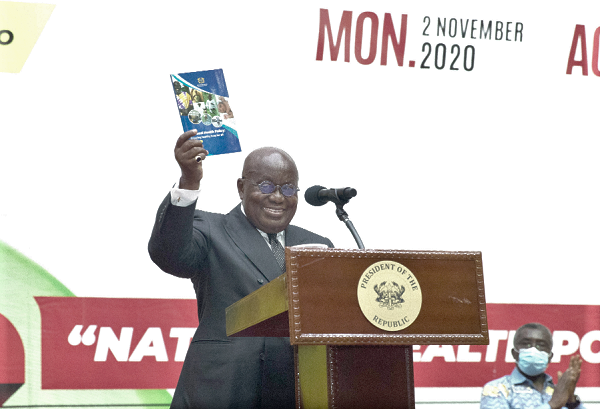
Revised National Health Policy launched
President Nana Addo Dankwa Akufo-Addo yesterday launched the revised National Health Policy and said lessons from the coronavirus disease (COVID-19) pandemic indicate that crisis in health can bring all other aspects of national life to a halt.
The revised health policy, titled: “Ensuring Healthy Lives for All”, is contained in a 28-page book that details five policy objectives, including, strengthening the healthcare delivery system to become resilient and encouraging the adoption of healthy lifestyles.
The others are improving the physical environment, improving the socio-economic status of the population and ensuring sustainable financing for health.
The document states that the objectives shall collectively ensure that there is improved alignment, complementarity and synergy within and across all public sector ministries, as well as with other stakeholders, towards achieving the national health goal.
Architecture
President Akufo-Addo said it was acknowledged that the existing health architecture was focused on sickness care, including the management of infectious diseases and maternal and child health conditions but not designed to provide comprehensive services.
That, he explained, was because those diseases were the predominant conditions at the time of the establishment of Ghana’s healthcare system before and after achieving independence.
He said the COVID-19 had offered the country an opportunity to take a second look at its healthcare system and the need for a revised health policy to cover key determinants of health and not just primary health care.
Adoption
He explained that the adoption of the new policy was aligned to the 17 UN Sustainable Development Goals (SDGs) Agenda 2030, which seeks to build a world that is “just, equitable and all embracing, with the desired end result being inclusive economic growth, social development and environmental protection for all without discrimination”.
President Akufo-Addo said the policy also derived inspiration from the Directive Principles of State Policy, as enshrined in the 1992 Constitution, which required the state to guarantee the right to good health care for people living in Ghana, irrespective of colour, race, geographical location, religion or political affiliation.
He said it was further motivated by the overall national medium-term policy framework set out in the Coordinated Framework of Economic and Social Development Policies — 2017-2024 and recognised by several global, continental and regional compacts and policy frameworks.
UHC
The President said in bringing action to bear on the National Health Policy and to ensure the attainment of universal health coverage (UHC), a UHC Roadmap 2020-2030 had been developed, with the vision to guaranteeing good health care for people living in the country.
He explained the national definition of UHC to mean that “all people in Ghana to have timely access to high-quality health services, irrespective of one’s ability at the point-of-use”, adding that with that definition, every Ghanaian would have access to quality healthcare services, without money being a barrier and with the National Health Insurance Scheme making sure of that.
He said ensuring access to health services would not be limited to geographical accessibility but also timely access to health services, especially in the context of emergency care.
District hospitals
President Akufo-Addo said the policy included implementing the construction of 111 district hospitals and the establishment of three infectious disease control centres in the northern, middle and southern belts of the country to help ensure that the country was better prepared to handle future pandemics.
National health goals
The Minister of Health, Mr Kwaku Agyemang-Manu, called on all stakeholders and health professionals to work assiduously to ensure that the policy was implemented successfully and addressed the collective and broad national health goals.
He was confident that it would form the basis for providing best possible preventive, curative, rehabilitative and palliative health services in the country through an integrated multi-sectoral approach that stimulated national development.
Overview
Giving an overview of the policy, the Director of Policy Planning, Monitoring and Evaluation at the Ministry of Health, Dr Emmanuel Ankrah Odame, said it was arrived at after wide consultations with stakeholders from all sectors of the country, including development partners.
In addition, he said, the policy was assessed by independent experts before it was agreed upon.
He said the objectives were to ensure that the public became resilient, led healthy lifestyles and preventative living, while ensuring that environmental pollution, ranging from noise in the environment and others, was minimised to secure healthy living for the people.
